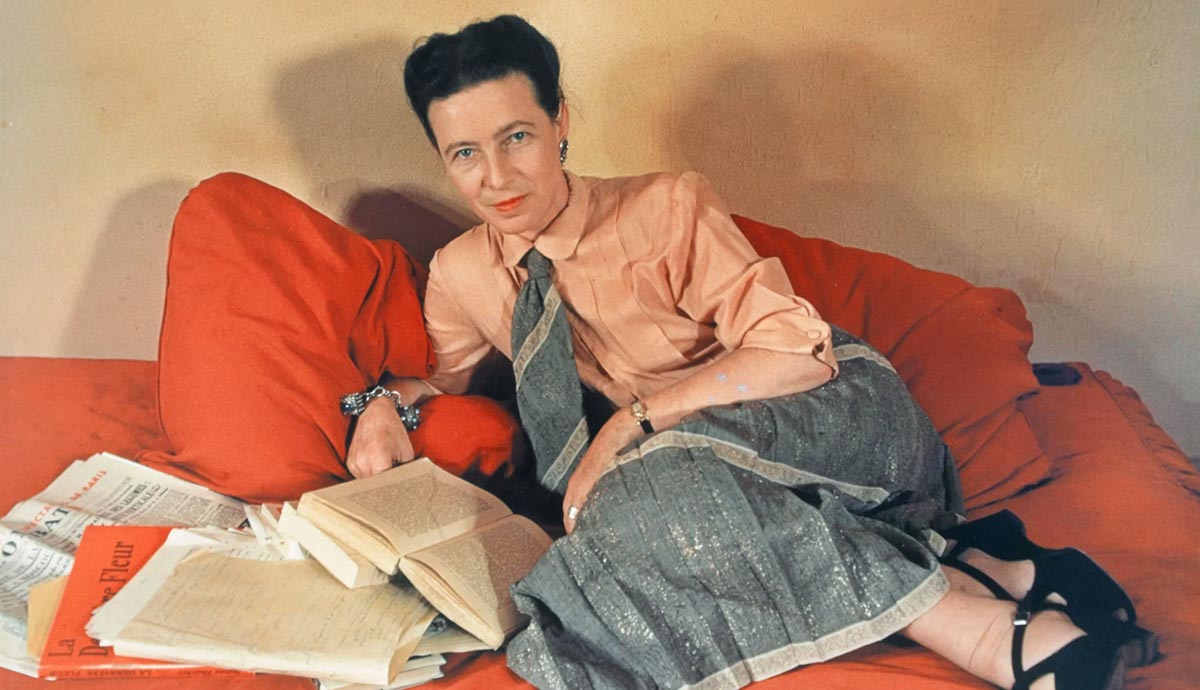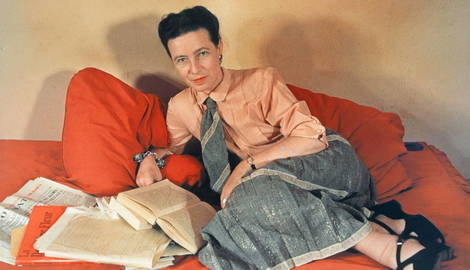
In her magnum opus, The Second Sex, 20th-century philosopher Simone de Beauvoir famously proclaimed that “one is not born, but rather becomes, a woman”. At a time when female identity was exclusively determined on biological grounds, she sought to redefine gender away from biological determinism and reinterpret embodiment within an existentialist framework. Her contributions to feminist discourse were considered revolutionary and continue to influence feminist thought today.
What a Woman Is, According to Simone de Beauvoir

According to Simone de Beauvoir, a woman is a subject whose identity has been historically ‘othered’ by men. Beauvoir’s first question in her masterpiece, The Second Sex, was “What is a woman?”. She observed that the female identity, like that of any oppressed social group, has long been systematically ‘othered’ in relation to the identity of the dominant social group—in this case, the male identity. In Beauvoir’s own words: “[a woman] is determined and differentiated in relation to man, while he is not in relation to her; she is the inessential in front of the essential. He is the Subject; he is the Absolute. She is the Other” (Beauvoir, 1949).

The alterity of the female identity, which has long sustained and justified oppression against women, has been the byproduct of what Beauvoir called ‘the essential feminine.’ The essential feminine refers to the general social consensus that the female gender is an innate fact of a woman’s existence. Domicility, passivity, and everything that characterized the ‘feminine’ in the 20th century were considered inherent and essential qualities of any biological female. In The Second Sex, Beauvoir challenged biological determinism by her groundbreaking reformulation of the female gender: “One is not born, but rather becomes, a woman” (Beauvoir, 1949).
How Simone de Beauvoir Challenged Biological Determinism

Simone De Beauvoir challenged biological determinism by redefining gender on existentialist grounds. One of the core tenets of existentialism is that human beings are not predetermined by a pre-existing nature or essence. Rather, they are shaped through their lived experience. Beauvoir applied the existentialist maxim ‘existence over essence’ to gender, arguing that gender is not essential but the byproduct of the realities of one’s existence. According to her, a biological female is not born as a gendered female. Rather, she assimilates the female gender through her lived experience.

Beauvoir’s refutation of biological and psychological arguments of the essentialism of gender lies in her reconceptualization of embodiment. According to her, “the body is not a thing, it is a situation” – a statement firmly rooted in existentialism and phenomenology (Beauvoir, 1949). By reframing the body as a situation one finds oneself within, she challenged the notion of the body being a fixed essence or identity. The reality of embodiment is a ‘being-in-situation’, the situation being the body itself as well as all the institutionalized meanings and conditions associated with it.
A woman is, therefore, not destined to ‘be a woman’ by virtue of her body, but by the normative social context built around her body. What Beauvoir means by “One is not born, but rather becomes, a woman” is precisely that the female gender is socially assimilated via the situation of embodiment rather than biologically intrinsic.
How Simone de Beauvoir Understood Female Autonomy

Simone De Beauvoir’s understanding of female autonomy lies in her notion of transcendence and immanence. According to her, transcendence refers to one’s ability to act freely beyond the conditions of one’s situation. It is the ability to actively and creatively determine one’s existence and shape one’s future. Immanence, on the other hand, refers to a confined, inert, and passive existence, where one succumbs to the limitations and conditions of one’s social situation. Beauvoir envisioned female autonomy as a movement from immanence to transcendence.
Rather than adhering to the status quo that situates her as ‘other’, a woman must rise beyond the institutionalized roles prescribed for her and determine her own existence for herself with freedom. The realization of autonomy necessitates the dismantlement of female alterity. A woman must define herself, not in reference to a man, but in reference to herself as an equal and free subject.
How Simone de Beauvoir Influenced Feminist Thought

Simone De Beauvoir influenced feminist thought to a great extent. Her masterpiece, The Second Sex, is considered to have laid the theoretical foundations of modern feminist philosophy. Her deconstruction of biological determinism and reformulation of gender on existentialist grounds left a lasting imprint on gender theory, influencing prominent figures such as Judith Butler. Further, her exposition of the intricacies of female oppression offered an otherwise absent lucidity on the complex social realities women inhabit and pointed a way for their resolution that significantly influenced the second wave of feminism. Today, Beauvoir’s contributions to feminist thought are an enduring beam of light that continues to shape and inspire feminists all over the world.










